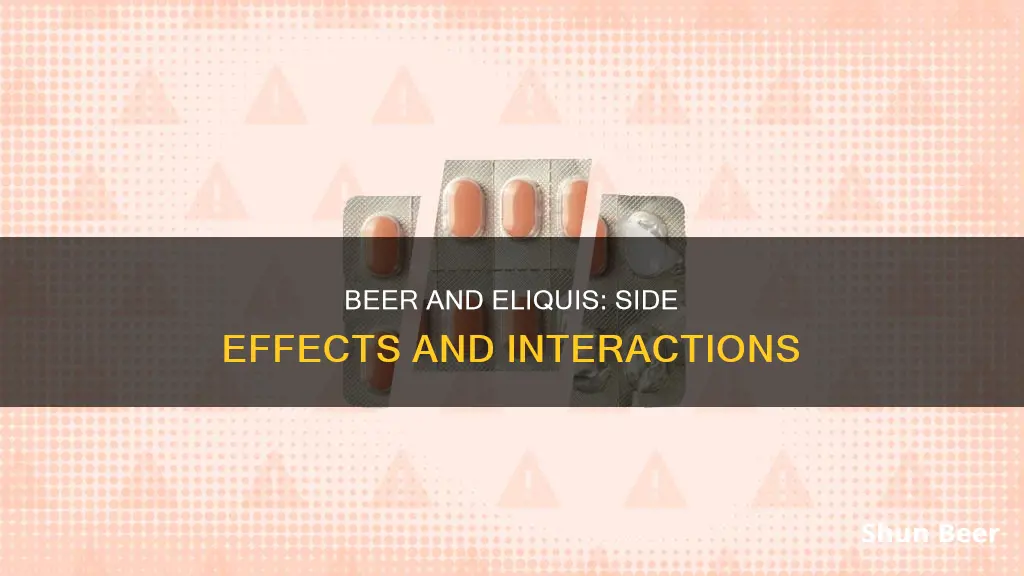
Eliquis is a popular blood thinner that has seen a significant increase in prescriptions in recent years. While the prescribing information for Eliquis does not specifically warn against alcohol use, it is important to understand the potential risks of mixing alcohol with this medication. Alcohol acts as a natural anticoagulant and can increase the risk of bleeding, especially when consumed with blood thinners like Eliquis. Excessive alcohol use can also lead to poor anticoagulation control and increase the risk of major hemorrhages. Therefore, it is generally recommended to limit alcohol intake while taking Eliquis, and individuals should consult their healthcare provider for personalized advice.
What You'll Learn

Eliquis is a blood thinner that slows down blood clotting
Eliquis is also used to prevent deep vein thrombosis (DVT) and pulmonary embolism (PE). DVT is a blood clot that forms in a vein deep inside the body, usually the leg, while PE is a blood clot that blocks blood flow to the lungs. Eliquis can also be prescribed to prevent the recurrence of DVT or PE and to prevent DVT that could lead to PE in people who have had hip or knee replacement surgery.
As a blood thinner, Eliquis increases the risk of severe or fatal bleeding, especially when taken with certain medications. It is important to inform your doctor about all medicines you have recently used. Eliquis should be stopped 24-48 hours before any surgery, invasive procedure, or dental work.
Side effects of Eliquis may include:
- Allergic reactions such as skin rash, itching, hives, or swelling of the face, lips, tongue, or throat
- Bleeding, including bloody or black stools, vomiting blood, heavy menstrual periods, unusual bruising, or bleeding from wounds
- Bleeding in the brain, with symptoms such as a severe headache, stiff neck, confusion, dizziness, changes in vision, or weakness
It is important to note that Eliquis has a boxed warning, the most serious warning from the FDA, which includes the risk of epidural or spinal hematoma, which could result in paralysis.
When taking Eliquis, it is recommended to avoid activities that may increase the risk of bleeding or injury, and to use extra care when shaving or brushing teeth.
Regarding alcohol consumption, while it does not directly interact with Eliquis, alcohol may act as a blood thinner and increase the risk of bleeding, especially when consumed together. Excessive alcohol use can lead to poor anticoagulation control and a higher risk of major hemorrhages. Therefore, it is advised to consult a healthcare provider for personalized advice on alcohol consumption while taking Eliquis.
Mono and Beer: Is It Safe to Drink?
You may want to see also

Alcohol acts as a natural blood thinner
When an injury occurs, blood cells called platelets rush to the site and stick together to form a plug and stop the bleeding. This process is called clotting and is beneficial when you are injured. However, sometimes a blood clot can form in or travel to an artery that supplies your heart or brain with blood. When a clot blocks blood flow to your heart, it can cause a heart attack, and if it blocks blood flow to your brain, it can cause a stroke.
Alcohol interferes with the clotting process by reducing the number of platelets in the blood and making the platelets you do have less sticky. This means that drinking alcohol could potentially increase your risk of having a stroke caused by bleeding in the brain, especially when consumed in large quantities. For men, this means more than two drinks a day, and for women, this is more than one drink a day.
Drinking alcohol in moderation may have a protective effect on your blood vessels. Some research finds that alcohol increases levels of high-density lipoproteins ("good cholesterol"), which helps protect your arteries and prevent the blood clots that can lead to heart attacks and strokes. However, there are other, less risky ways to protect your arteries, such as eating a plant-based diet and exercising.
The American Heart Association does not recommend drinking alcohol solely to protect your blood vessels and improve your circulation. If you are taking a blood thinner, such as Eliquis, and drinking alcohol, you increase your risk of internal bleeding. This is because both alcohol and Eliquis thin the blood, and taking both together could compound the anticoagulant effect.
If you are taking a blood thinner, you should consult your doctor about drinking alcohol.
Beer and Blood Donation: What's the Connection?
You may want to see also

Combining Eliquis and alcohol may increase the risk of bleeding
Eliquis is a prescription medication that slows down blood clotting in the body. It is prescribed for patients at risk of blood clots and strokes. As a blood thinner, Eliquis increases the time it takes for bleeding to stop. Combining Eliquis with alcohol may increase the risk of bleeding events, particularly in the gastrointestinal tract. This is because alcohol also acts as a blood thinner and can therefore increase the risk of internal bleeding.
Internal bleeding can occur in any part of the body where there are large blood vessels, such as the stomach or intestines. It may also occur in areas with low pressure, such as the brain. Combining blood thinners and alcohol can also cause bleeding in the joints, such as the knees and elbows, and in areas where bones rub against each other without much protective tissue, such as the nose bridge or skull base.
The risk of bleeding is greater for those taking a blood thinner. Alcohol can interact with certain medications to increase their potency, leading to dangerous side effects. Alcohol can also damage the lining of blood vessels, causing blood clots that can break off and trigger a stroke or heart attack.
Heavy drinking, especially binge drinking, is dangerous while taking Eliquis. The alcohol can increase the risk of bleeding. However, moderate alcohol consumption is generally considered safe while taking most blood thinners, including Eliquis. For healthy adults, doctors recommend limiting alcohol intake to a maximum of two drinks a day for males and one drink a day for females.
Teeth Whitening and Beer: What You Need to Know
You may want to see also

Alcohol may affect how the body absorbs Eliquis
Eliquis is a prescription medication that slows down blood clotting in the body. It is prescribed for patients at risk of blood clots and strokes. Eliquis is the brand name for the generic medication apixaban, a type of anticoagulant.
In addition to potentially affecting the absorption of Eliquis, alcohol can also act as a natural anticoagulant. This means that it can thin the blood, potentially increasing the risk of bleeding, especially when consumed with Eliquis. Alcohol consumption has been linked to the development of high blood pressure, high cholesterol, diabetes, and obesity—all risk factors for heart disease and stroke.
While the prescribing information for Eliquis does not specifically warn against alcohol use, individuals should consult their healthcare provider for personalized advice due to the potential increased risk of bleeding and other alcohol-related health complications.
Drinking Beer in Vondelpark: What You Need to Know
You may want to see also

People with liver problems should be cautious when drinking on Eliquis
Eliquis is a prescription medication that slows down blood clotting in the body. It is a popular blood thinner that is prescribed to reduce blood clotting and has seen a significant increase in prescriptions in recent years. While the prescribing information for Eliquis does not specifically warn against alcohol use, individuals taking this medication should be cautious about drinking alcohol, especially those with liver problems.
It is important to understand the potential side effects and interactions of Eliquis with other substances, including alcohol. The most common side effect of Eliquis is bleeding, which can range from slight nosebleeds or bruising to severe bleeding in the digestive tract, brain, or kidneys. Alcohol, on the other hand, is a known natural anticoagulant and can also increase the risk of bleeding. Therefore, drinking alcohol while taking Eliquis may further increase the risk of bleeding, especially in individuals with liver problems.
Heavy drinkers or those who drink regularly may experience liver-related issues such as fatty liver disease, alcoholic hepatitis, and cirrhosis. These conditions can impair the liver's ability to metabolize drugs correctly, which can further increase the risk of bleeding when taking blood thinners like Eliquis. As such, it is recommended that individuals taking Eliquis limit their alcohol consumption or abstain from drinking altogether, especially if they have existing liver problems.
It is always advisable to consult with a healthcare professional before consuming alcohol while taking any medication, including Eliquis. A healthcare provider can evaluate individual circumstances and provide personalized advice regarding the risks associated with mixing alcohol and Eliquis, taking into account medical history, risk factors, and other medications being taken.
Beer and Itching: Is There a Connection?
You may want to see also
Frequently asked questions
It is not recommended to drink beer or any alcoholic beverage while taking Eliquis, as alcohol can act as a blood thinner and increase the risk of internal bleeding. However, moderate alcohol consumption (up to two drinks per day for men and one drink per day for women) is generally considered safe for healthy adults taking most blood thinners, including Eliquis.
Combining Eliquis with alcohol may increase the risk of bleeding, especially in the gastrointestinal tract, stomach, intestines, and brain. Alcohol can also affect the rate at which Eliquis is absorbed into the body, potentially reducing its effectiveness.
There do not appear to be any long-term harmful effects from taking Eliquis for extended periods. However, it is important to consult with a healthcare professional before stopping the medication, as doing so can increase the risk of serious problems like strokes or heart attacks.
If you experience any side effects or severe symptoms, such as constant bleeding, intense pain, or dizziness, seek emergency medical attention. It is important to be open with your doctor about your alcohol consumption to ensure you receive proper treatment and advice.







